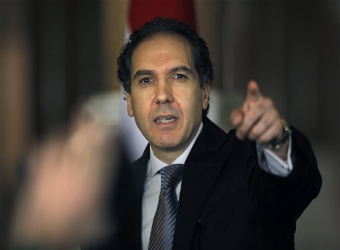As Egyptian security forces moved to end a bloody standoff with supporters of Egypt’s ousted president on Saturday, government officials were assailing a different foe: the Western media and critical foreign governments.
In a statement emailed in English to foreign correspondents Saturday, the Egyptian State Information Service rebuked reporters for what it called “biased coverage” that it said privileged supporters of Mohammed Morsi over the security services who have been fighting them.
The SIS also castigated the foreign press for not paying enough attention to attacks on Christians and Islamists’ “intimidation” of ordinary Egyptian citizens.
“Egypt is feeling severe bitterness towards some Western media coverage that is biased to the Muslim Brotherhood and ignores shedding light on violent and terror acts that are perpetrated by this group in the form of intimidation operations and terrorizing citizens,” said the unsigned statement.
The statement came hours after an English-language televised address by Mostafa Hegazi, a presidential advisor, who told foreign journalists that “we as Egyptians feel deep bitterness towards coverage of the events in Egypt.”
Mr. Hegazi also praised the Egyptian military and police’s handling of two bloody incidents in the past week — breaking up two Cairo protest camps on Wednesday and ending a standoff at a mosque on Saturday. At least 600 people died as the camps were dispersed, and 173 died in clashes on Friday and Saturday.
The two official statements overlay a steady drumbeat of antagonism against foreigners and the foreign press — a tactic that autocratic Arab leaders have regularly employed to deflect blame for internal unrest and human rights abuses.
But the rhetoric against foreigners and the foreign press has risen to unprecedented levels over the past week and turned Egypt into a highly hostile environment for foreign reporters.
Several foreign journalists reported facing harassment and attacks on Saturday. A reporter for The Wall Street Journal and Alastair Beach, a journalist for Britain’s The Independent, were both grabbed and lightly beaten by mobs of anti-Morsi demonstrators outside the beseiged mosque on Saturday.
Mr. Beach said he was bludgeoned over the head with a stick, but suffered no serious injuries.
The mob turned the two reporters over to nearby soldiers, who kept them in protective custody before releasing them away from the scene about an hour later.
Patrick Kingsley, a correspondent for The Guardian, also reported over Twitter that he was “citizen arrested” by a group of angry youth who stole his laptop and mobile phone before turning him over to police.
He was also eventually released without any serious injuries.
Anger against the foreign press is of a piece with the growing preoccupation among Egyptians over foreign governments’ recent criticism of security forces’ deadly crackdowns on Islamists.
President Barack Obama’s decision on Thursday to cancel bi-annual military exercises with Egypt after the crackdown on the pro-Morsi encampments was met with widespread hostility here.
When authorities ousted Mr. Morsi on July 3, they moved immediately to shut down the Islamist channels that had often adopted pro-Morsi editorial lines.
The Egyptian public has since been treated to vitriolic anti-Islamist messages from both the public and private media. Television stations regualry refer to the Brotherhood as “terrorists” while accusing them of using heavy weapons against security forces and of associating with international terrorist groups such as Al Qaeda.
Such media outlets — particularly the private channels owned by prominent businessmen with connections to the former regime of Hosni Mubarak — have also helped fan anti-foreigner sentiment.
Guests on the privately owned satellite channels have regularly accused foreign journalists of deliberately waging a disinformation campaign to aid Mr. Morsi’s Islamist backers.
Source: Wall Street Journal










